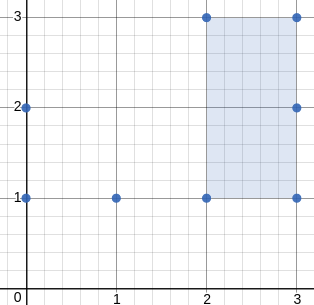[Swift]LeetCode963. 最小面积矩形 II | Minimum Area Rectangle II
★★★★★★★★★★★★★★★★★★★★★★★★★★★★★★★★★★★★★★★★
➤微信公众号:山青咏芝(shanqingyongzhi)
➤博客园地址:山青咏芝(https://www.cnblogs.com/strengthen/)
➤GitHub地址:https://github.com/strengthen/LeetCode
➤原文地址:https://www.cnblogs.com/strengthen/p/10165340.html
➤如果链接不是山青咏芝的博客园地址,则可能是爬取作者的文章。
➤原文已修改更新!强烈建议点击原文地址阅读!支持作者!支持原创!
★★★★★★★★★★★★★★★★★★★★★★★★★★★★★★★★★★★★★★★★
Given a set of points in the xy-plane, determine the minimum area of any rectangle formed from these points, with sides not necessarily parallel to the x and y axes.
If there isn't any rectangle, return 0.
Example 1:

Input: [[1,2],[2,1],[1,0],[0,1]]
Output: 2.00000
Explanation: The minimum area rectangle occurs at [1,2],[2,1],[1,0],[0,1], with an area of 2.
Example 2:

Input: [[0,1],[2,1],[1,1],[1,0],[2,0]]
Output: 1.00000
Explanation: The minimum area rectangle occurs at [1,0],[1,1],[2,1],[2,0], with an area of 1.
Example 3:

Input: [[0,3],[1,2],[3,1],[1,3],[2,1]]
Output: 0
Explanation: There is no possible rectangle to form from these points.
Example 4:

Input: [[3,1],[1,1],[0,1],[2,1],[3,3],[3,2],[0,2],[2,3]]
Output: 2.00000
Explanation: The minimum area rectangle occurs at [2,1],[2,3],[3,3],[3,1], with an area of 2.
Note:
1 <= points.length <= 500 <= points[i][0] <= 400000 <= points[i][1] <= 40000- All points are distinct.
- Answers within
10^-5of the actual value will be accepted as correct.
给定在 xy 平面上的一组点,确定由这些点组成的任何矩形的最小面积,其中矩形的边不一定平行于 x 轴和 y 轴。
如果没有任何矩形,就返回 0。
示例 1:

输入:[[1,2],[2,1],[1,0],[0,1]] 输出:2.00000 解释:最小面积的矩形出现在 [1,2],[2,1],[1,0],[0,1] 处,面积为 2。
示例 2:

输入:[[0,1],[2,1],[1,1],[1,0],[2,0]] 输出:1.00000 解释:最小面积的矩形出现在 [1,0],[1,1],[2,1],[2,0] 处,面积为 1。
示例 3:

输入:[[0,3],[1,2],[3,1],[1,3],[2,1]] 输出:0 解释:没法从这些点中组成任何矩形。
示例 4:

输入:[[3,1],[1,1],[0,1],[2,1],[3,3],[3,2],[0,2],[2,3]] 输出:2.00000 解释:最小面积的矩形出现在 [2,1],[2,3],[3,3],[3,1] 处,面积为 2。
提示:
1 <= points.length <= 500 <= points[i][0] <= 400000 <= points[i][1] <= 40000- 所有的点都是不同的。
- 与真实值误差不超过
10^-5的答案将视为正确结果。
460ms
1 class Solution { 2 func minAreaFreeRect(_ points: [[Int]]) -> Double { 3 var ans:Double = -1 4 var set:Set<Int> = Set<Int>() 5 for p in points 6 { 7 set.insert((p[0] << 16) | p[1]) 8 } 9 10 var n:Int = points.count 11 for i in 0..<n 12 { 13 for j in 0..<n 14 { 15 var x0:Int = points[j][0] - points[i][0] 16 var y0:Int = points[j][1] - points[i][1] 17 if i != j 18 { 19 for k in 0..<n 20 { 21 if i != k && j != k 22 { 23 var x1:Int = points[k][0] - points[i][0] 24 var y1:Int = points[k][1] - points[i][1] 25 if x0 * x1 + y0 * y1 == 0 26 { 27 var x:Int = points[j][0] + points[k][0] - points[i][0] 28 var y:Int = points[j][1] + points[k][1] - points[i][1] 29 if set.contains((x << 16) | y) 30 { 31 var cur:Double = sqrt(Double(x0 * x0 + y0 * y0)) * sqrt(Double(x1 * x1 + y1 * y1)) 32 if ans < 0 || ans > cur 33 { 34 ans = cur 35 } 36 } 37 } 38 } 39 } 40 } 41 } 42 } 43 return ans < 0 ? 0 : ans 44 } 45 }





【推荐】国内首个AI IDE,深度理解中文开发场景,立即下载体验Trae
【推荐】编程新体验,更懂你的AI,立即体验豆包MarsCode编程助手
【推荐】抖音旗下AI助手豆包,你的智能百科全书,全免费不限次数
【推荐】轻量又高性能的 SSH 工具 IShell:AI 加持,快人一步
· 记一次.NET内存居高不下排查解决与启示
· 探究高空视频全景AR技术的实现原理
· 理解Rust引用及其生命周期标识(上)
· 浏览器原生「磁吸」效果!Anchor Positioning 锚点定位神器解析
· 没有源码,如何修改代码逻辑?
· 全程不用写代码,我用AI程序员写了一个飞机大战
· MongoDB 8.0这个新功能碉堡了,比商业数据库还牛
· DeepSeek 开源周回顾「GitHub 热点速览」
· 记一次.NET内存居高不下排查解决与启示
· 白话解读 Dapr 1.15:你的「微服务管家」又秀新绝活了